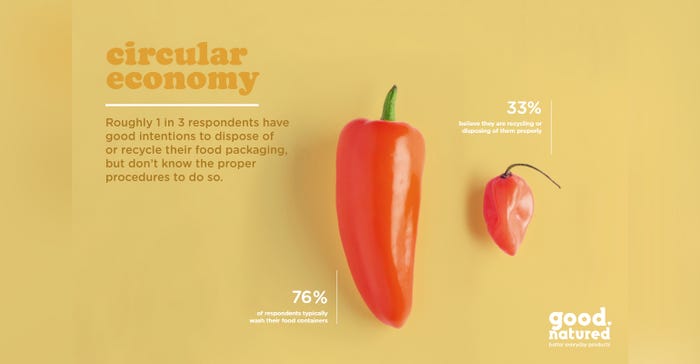Report: Consumers Conscious of Food Packaging, Lack Faith in their Recycling
Today, good nature® published its Ready-to-Eat report, detailing concerns consumers have with plastic food packaging and being eco-friendly.

The pandemic changed all our lives in a bunch of different ways. Some changes may have been temporary, and others look like they’re here to stay for the foreseeable future. One of those long-lasting changes has been consumers ordering takeout or purchasing ready-to-eat meals from the grocery store. The convenience of these meals is great for consumers; however, this increase is contributing to several issues when considering the added waste and recycling practices.
According to a recently published Ready-to-Eat Report by good natured® (which surveyed 1,000 people aged 18 to 64), 72% of respondents in this study claim they are consistently buying or increasing their consumption of ready-to-eat meals and takeout food since the beginning of 2023. Of the respondents, 70% site convenience as being the number one reason for purchasing these meals.
“Convenience eating has always been a trend,” said Paul Antoniadis, CEO of good natured®, “but what’s changed is how people are consuming takeout meals. What was once grabbing a pizza and bringing it home, has turned into salad bars and grab-and-go lunches from the grocery store, pickup and takeout from your favorite restaurants, and quick service meal spots where you can dine-in or takeaway. With the number of options available and the ability to customize meals and smaller portion sizes, it’s no surprise that consumers want to continue to take advantage of the convenience and variety that ready-to-eat meals offer.”
While the convenience is nice and these types of meals were certainly needed during the COVID-19 pandemic and quarantines, it has contributed to a substantial increase in plastic waste. According to report from ACS Publications, plastic waste increased by 30% in the United States after the COVID-19 pandemic began. In addition, a study from Nature Sustainability in 2021 reports that nearly half of the plastic found in the ocean is made up from single-use items such as plastic cutlery, straws, bottles, and plastic packaging.
The good news is the Ready-to-Eat report states that 77% of its respondents say eco-friendly food packaging is important to them and consider a product’s packaging when shopping. However, the bad news is that nearly 50% of the study’s respondents think it’s the business’s responsibility to provide eco-friendly food packaging to help reduce the effects of climate change. As we know from talking with other sustainability experts and eco-friendly leaders, it takes all of us to be responsible with our recycling, waste habits, and conservation to help prevent climate change.

Speaking of recycling, the Ready-to-Eat report confirmed a key issue with recycling today that we already know, more consumer education is needed for proper disposal of products and recycling. According to the report, almost 1 in 3 respondents want to recycle their food packaging effectively but note that they don’t know the proper procedures to do so. Also, 76% of respondents claim they usually wash their food containers before disposing of them, but only 33% of respondents believe they are recycling these food packages properly. At least the report offers the good news that most of us want to be better recyclers, we just need more direction on the dos and don’ts.
Luckily for fans of social media and doom-scrollers alike, different social media platforms are giving a voice to recycling practices and education. Through this, 53% of participants in the Ready-to-Eat report say that they are influenced by social media to become more eco-friendly. Between the dances and memes, let’s hope people are taking away a few recycling tips, too.
What we can learn from good nature®’s Ready-to-Eat report is that people are conscious of their food packaging and the effects of plastic waste. Which is a great first step, but we need to get into a recycling mindset, increase our familiarity of sustainable practices, and learn where they can help. We need more consumers to take ownership of their buying habits and follow through the process of effective recycling.
About the Author
You May Also Like


.png?width=300&auto=webp&quality=80&disable=upscale)

